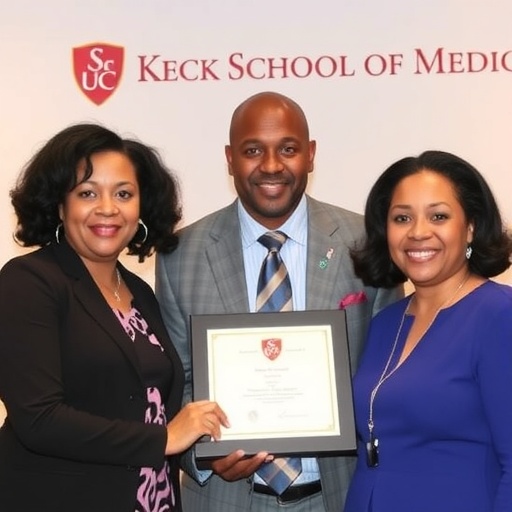The Keck School of Medicine of USC has been honored with the prestigious Spencer Foreman Award for Outstanding Community Engagement by the Association of American Medical Colleges (AAMC), a testament to its profound dedication to addressing the crucial needs of Los Angeles communities. This recognition is a reflection of the school’s institutional mission to integrate community engagement into all its facets—education, research, and patient care—driving tangible improvements in the health and wellbeing of its diverse neighboring populations.
Founded more than a century ago, the AAMC serves as a pivotal organization at the nexus of medical education, research, health care, and community partnerships across North America. Its selection of Keck for this award underscores the school’s innovative approaches to embedding community priorities into clinical and academic activities, thus setting a benchmark for medical institutions nationwide.
Central to Keck’s community engagement strategy is its commitment to collaborative needs assessments conducted triennially alongside Keck Medicine of USC. This evaluative process involves extensive consultation with local residents, who serve as essential partners in articulating health challenges and shaping responsive programs. By anchoring priorities in community-identified concerns, Keck enhances the relevance and efficacy of its outreach efforts, breaking down traditional academic silos and fostering genuine, trust-based partnerships.
This foundational ethos is vividly illustrated by the medical school’s curricular innovations, particularly the “Health Justice and Systems of Care” course integrated into the MD program’s first year. This pedagogical framework challenges future physicians to expand their clinical lens beyond pathology to encompass social determinants of health and systemic barriers to care. Such training cultivates a new generation of “Physician-Citizen-Scholars” equipped to advocate for and deliver equitable health services within complex social ecosystems.
From the outset of their training, students engage directly with the community through initiatives like Keck in the Community Day, where they participate in food banks, schools, and other service sites. These immersive experiences not only ground learners in the lived realities of their patients but also foster a deep-seated institutional culture of service, alerting them early to the myriad social factors influencing health.
Beyond education, Keck’s youth-focused programs exemplify long-term investment in shaping the health workforce pipeline while addressing educational disparities. Programs such as the PA Pathways and Youth Workforce Academy provide targeted opportunities ranging from exposure to healthcare careers to certification in essential medical skills. These programs not only empower underserved young people with vocational training but statistically translate into increased employment and higher education enrollment, demonstrating measurable socioeconomic impact.
One of Keck’s hallmark initiatives, Med-COR, offers high school students sustained academic enrichment and family engagement, yielding graduation and college matriculation rates well above local averages. This program notably integrates educational support with community partnership and parental involvement, creating a comprehensive model for addressing intergenerational challenges in underserved populations.
Keck’s ethos of direct, location-based care provision is embodied in its USC Street Medicine program, an innovative clinical outreach model launched in 2018 that deploys interdisciplinary teams to deliver healthcare to unhoused individuals in situ. This approach not only improves accessibility and comfort for patients but also generates significant clinical outcomes, including reduced hospital admissions and enhanced connection to housing services. The program’s evolution and impact have positioned it as a national exemplar in integrating street medicine with academic training.
Engagement extends into research arenas through community advisory boards such as the one functioning within the USC Norris Comprehensive Cancer Center. This board comprises survivors and advocates from ethnically and culturally diverse backgrounds, providing critical guidance on research priorities and methodologies. Their input ensures that scientific investigations are both ethically grounded and culturally competent, enhancing translational potential and community trust.
Keck’s commitment to inclusivity is further demonstrated in its clinical trial efforts, emphasizing recruitment that mirrors Los Angeles’s multilingual and multicultural makeup. This focus addresses a crucial equity issue in biomedical research: the need for diverse participation to develop personalized therapies that are effective across varied demographics. Such integrative efforts simultaneously advance clinical science and foster broader health justice.
The overarching narrative of Keck School of Medicine’s community engagement is one of symbiotic partnership, where listening and response are continuous and reciprocal. Trust is the currency that undergirds these initiatives, empowering communities as co-creators in health innovation rather than passive recipients. The recognition by the AAMC not only honors past achievements but also galvanizes further evolution of this integrative model, which stands as an inspiring paradigm for academic medicine at large.
Through these diverse and interconnected efforts, Keck is forging a future where medical education, research, and clinical care are enmeshed with community realities. This holistic vision, anchored in mutual respect and evidence-based programs, positions the Keck School of Medicine as a leader in redefining the interface between academic medicine and the populations it serves—ultimately amplifying health equity on a metropolitan scale.
Subject of Research: Community Engagement in Medical Education and Health Care Delivery
Article Title: Keck School of Medicine of USC Recognized by AAMC for Outstanding Community Engagement
News Publication Date: Not specified
Web References:
– https://keck.usc.edu/
– https://keckmedicine.org/
– https://uscnorriscancer.usc.edu/
– https://keck.usc.edu/community/
– https://keck.usc.edu/physician-assistant-program/student-life/usc-pa-pathways/
– https://keck.usc.edu/street-medicine/
Image Credits: Photo/USC
Keywords: Education; Clinical trials; Health care; Human health; Cancer; Young people; Homelessness




